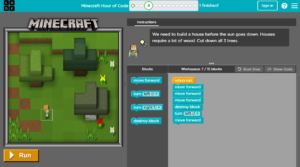To keep school relevant and motivating for students, learning goals should be connected to real life. In programming teaching we see too many “piggy trains” where one just happily follows instructions. Coding should be taught for real life, meaning that teaching should be connected to the students’ interests, projects, and phenomena.
Piggy train: just follow orders
Coding in school is such a hyped field that there are countless companies and initiatives out there, from physical construction kits and robotics to web-based programming learning environments. Unfortunately many of them take the easy way out.

We call “piggy trains” these learning environments where kids just click on things according to instructions. The tasks contain no possibility for creativity or self-expression. These tools are entertaining and they have a place in helping to rehearse some fundamental skills, but the learning outcomes are also limited to training of a few logical concepts.
Hour of Code is a popular and high quality example. One learns to formulate command sequences and create loops with Minecraft or Angry Birds characters.

Project learning: let’s do stuff we care about
If students should learn more than basic logic, they should also really code – create something new. Programming is an art form, just like that other mathematical field, music. This means that the student should come up with their own creation that they make. The teacher can certainly put limits according to the curriculum, but the pupil should be able to make independent decisions about their own project: what it will exactly be, and how they will build it.
It’s best to consider coding as a general purpose learning tool in addition to reading, writing, calculation, and drawing, and use it in project learning.
Code School Finland’s all learning materials are based on project learning. Students are given shared goals by also freedom to choose their own individual targets, methods, and materials, within the limits given by the teacher. A good teacher will allow students to create their own projects that relate to the subject matter at hand as well as each student’s personal interests.
Leave a Reply